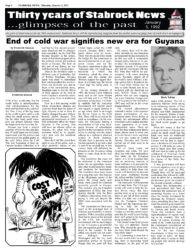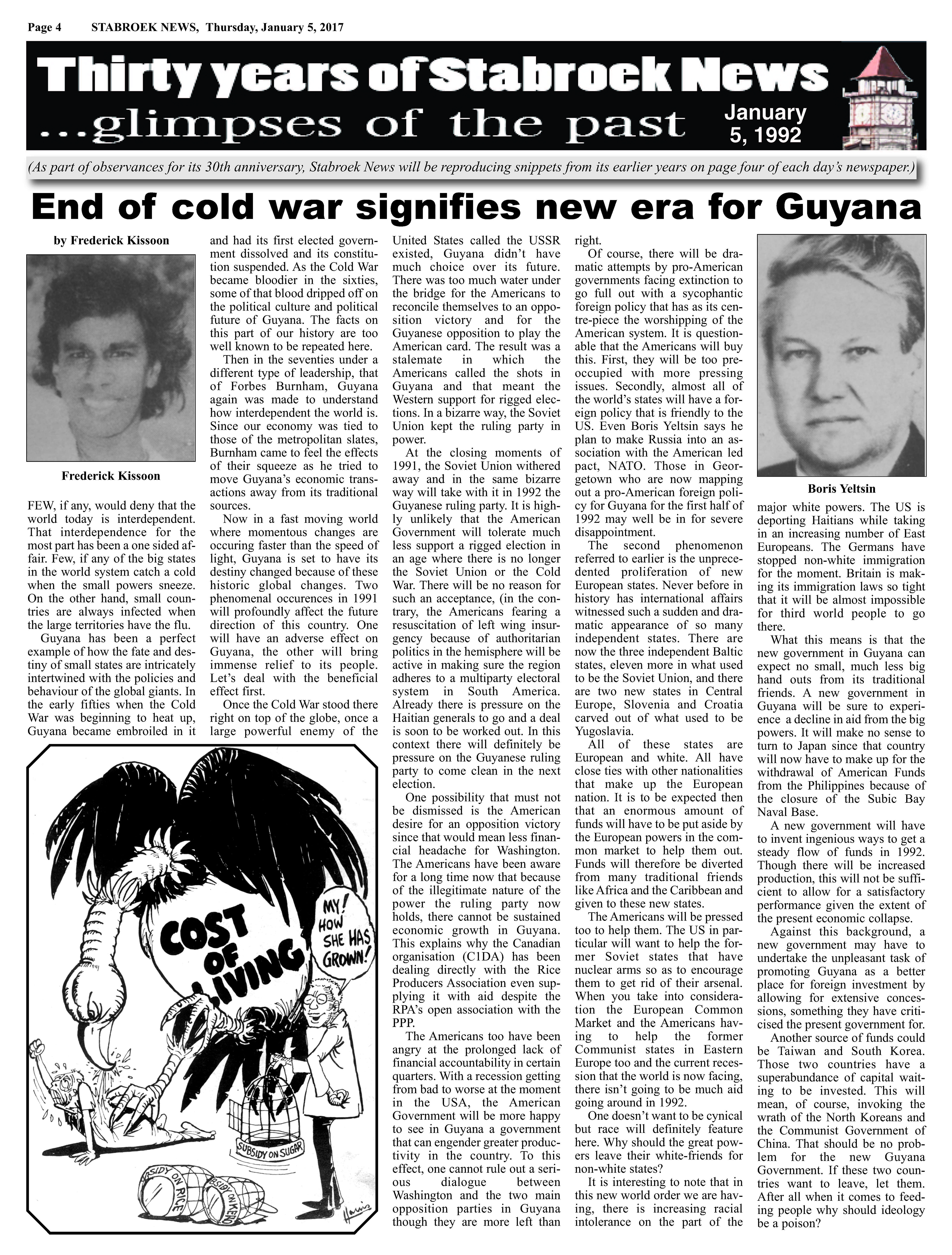by Frederick Kissoon
FEW, if any, would deny that the world today is interdependent. That interdependence for the most part has been a one sided affair. Few, if any of the big states in the world system catch a cold when the small powers sneeze. On the other hand, small countries are always infected when the large territories have the flu.
Guyana has been a perfect example of how the fate and destiny of small states are intricately intertwined with the policies and behaviour of the global giants.
In the early fifties when the Cold War was beginning to heat up, Guyana became embroiled in it and had its first elected government dissolved and its constitution suspended.
As the Cold War became bloodier in the sixties, some of that blood dripped off on the political culture and political future of Guyana. The facts on this part of our history are too well known to be repeated here.
 Then in the seventies under a different type of leadership, that of Forbes Burnham, Guyana again was made to understand how interdependent the world is.
Then in the seventies under a different type of leadership, that of Forbes Burnham, Guyana again was made to understand how interdependent the world is.
Since our economy was tied to those of the metropolitan slates, Burnham came to feel the effects of their squeeze as he tried to move Guyana’s economic transactions away from its traditional sources.
Now in a fast moving world where momentous changes are occuring faster than the speed of light, Guyana is set to have its destiny changed because of these historic global changes. Two phenomenal occurences in 1991 will profoundly affect the future direction of this country. One will have an adverse effect on Guyana, the other will bring immense relief to its people. Let’s deal with the beneficial effect first.
Once the Cold War stood there right on top of the globe, once a large powerful enemy of the United States called the USSR existed, Guyana didn’t have much choice over its future. There was too much water under the bridge for the Americans to reconcile themselves to an opposition victory and for the Guyanese opposition to play the American card.
The result was a stalemate in which the Americans called the shots in Guyana and that meant the Western support for rigged elections. In a bizarre way, the Soviet Union kept the ruling party in power.
At the closing moments of 1991, the Soviet Union withered away and in the same bizarre way will take with it in 1992 the Guyanese ruling party. It is highly unlikely that the American Government will tolerate much less support a rigged election in an age where there is no longer the Soviet Union or the Cold War.
There will be no reason for such an acceptance, (in the contrary, the Americans fearing a resuscitation of left wing insurgency because of authoritarian politics in the hemisphere will be active in making sure the region adheres to a multiparty electoral system in South America. Already there is pressure on the Haitian generals to go and a deal is soon to be worked out. In this context there will definitely be pressure on the Guyanese ruling party to come clean in the next election.
One possibility that must not be dismissed is the American desire for an opposition victory since that would mean less financial headache for Washington. The Americans have been aware for a long time now that because of the illegitimate nature of the power the ruling party now holds, there cannot be sustained economic growth in Guyana. This explains why the Canadian organisation (C1DA) has been dealing directly with the Rice Producers Association even supplying it with aid despite the RPA’s open association with the PPP.
The Americans too have been angry at the prolonged lack of financial accountability in certain quarters. With a recession getting from bad to worse at the moment in the USA, the American Government will be more happy to see in Guyana a government that can engender greater productivity in the country. To this effect, one cannot rule out a serious dialogue between Washington and the two main opposition parties in Guyana though they are more left than right.
Of course, there will be dramatic attempts by pro-American governments facing extinction to go full out with a sycophantic foreign policy that has as its centre piece the worshipping of the American system. It is questionable that the Americans will buy this. First, they will be too preoccupied with more pressing issues. Secondly, almost all of the world’s states will have a foreign policy that is friendly to the US.
Even Boris Yeltsin says he plan to make Russia into an association with the American led pact, NATO. Those in Georgetown who are now mapping out a pro-American foreign policy for Guyana for the first half of 1992 may well be in for severe disappointment.
The second phenomenon referred to earlier is the unprecedented proliferation of new European states. Never before in history has international affairs witnessed such a sudden and dramatic appearance of so many independent states.
There are now the three independent Baltic states, eleven more in what used to be the Soviet Union, and there are two new states in Central Europe, Slovenia and Croatia carved out of what used to be Yugoslavia.
All of these states are European and white. All have close ties with other nationalities that make up the European nation. It is to be expected then that an enormous amount of funds will have to be put aside by the European powers in the common market to help them out.
Funds will therefore be diverted from many traditional friends like Africa and the Caribbean and given to these new states.
The Americans will be pressed too to help them. The US in particular will want to help the former Soviet states that have nuclear arms so as to encourage them to get rid of their arsenal. When you take into consideration the European Common Market and the Americans having to help the former Communist states in Eastern Europe too and the current recession that the world is now facing, there isn’t going to be much aid going around in 1992.
One doesn’t want to be cynical but race will definitely feature here. Why should the great powers leave their white-friends for non-white states?
It is interesting to note that in this new world order we are having, there is increasing racial intolerance on the part of the major white powers.
The US is deporting Haitians while taking in an increasing number of East Europeans. The Germans have stopped non-white immigration for the moment. Britain is making its immigration laws so tight that it will be almost impossible for third world people to go there.
What this means is that the new government in Guyana can expect no small, much less big hand outs from its traditional friends. A new government in Guyana will be sure to experience a decline in aid from the big powers. It will make no sense to turn to Japan since that country will now have to make up for the withdrawal of American Funds from the Philippines because of the closure of the Subic Bay Naval Base.
A new government will have to invent ingenious ways to get a steady flow of funds in 1992. Though there will be increased production, this will not be sufficient to allow for a satisfactory performance given the extent of the present economic collapse.
Against this background, a new government may have to undertake the unpleasant task of promoting Guyana as a better place for foreign investment by allowing for extensive concessions, something they have criticised the present government for.
Another source of funds could be Taiwan and South Korea. Those two countries have a superabundance of capital waiting to be invested. This will mean, of course, invoking the wrath of the North Koreans and the Communist Government of China. That should be no problem for the new Guyana Government. If these two countries want to leave, let them. After all when it comes to feeding people why should ideology be a poison?

